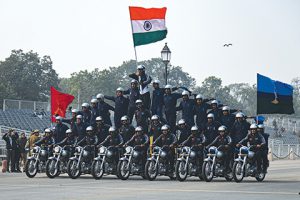Bloomberg
India is set to use this week’s meeting of finance ministers and central bank governors from the Group of 20 nations to try to amplify its influence over developing economies in Asia, Africa and Latin America called the Global South.
Without the cash to dole out billions in loans like China did under President Xi Jinping’s Belt-and-Road Initiative, India is seeking to use soft power by championing issues important to struggling nations such as debt relief. That’s one issue that may emerge as a key theme at the meetings in Bengaluru on February 24-25.
While China is the obvious rival, India doesn’t want to be constrained by the US and its allies either and will stick up for its own interests on matters such as energy security. For Prime Minister Narendra Modi, this year’s hosting of the G-20 is an opportunity to leverage India’s growing strategic and economic heft.
India’s geopolitical importance to the US and its allies has increased as American policy makers seek to contain Beijing’s rise, with an increased focus on the Quad grouping that also includes Japan and Australia.
Already the world’s most-populous nation according to some estimates, India is one of the fastest-expanding economies at a time of sluggish growth around the globe, luring companies like Apple Inc to expand.
Even before kicking off key
G-20 gatherings, New Delhi organised a virtual Global South summit in mid-January where Modi said: “As far as India is concerned, your voice is India’s voice. Your priorities are India’s priorities.â€
Nirmala Sitharaman, in an address to fellow finance ministers from across 14 economies as far-flung as Belize and Sierra Leone during that summit, said that as G-20 host, India seeks to “rebuild trust in multilateralism†and greater inclusion of struggling nations in discussions.
Reforming multilateral institutions, assistance for low- and middle-income countries on debt vulnerability and climate initiatives are among India’s priorities, according to the nation’s Chief Economic Adviser V Anantha Nageswaran.
As poorer nations face debt distress, India is pushing that conversation into the mainstream. G-20 sherpa, Amitabh Kant, publicly pressured China to be more transparent on its loans to low-income countries and to take some losses.
India’s self-nomination as the leader of the Global South is the culmination of messaging on the global stage that it will not simply play by the rules and norms of more powerful nations.
The government crackdown on BBC that met no resounding reprimand from the US and allies shows Modi’s success at leveraging his nation’s rising importance. India is on the rise, but sinister designs are there, to set afloat a narrative against us.
This is another way of invasion. We have to be alert.
India’s resistance to some Western ideas extended to a more combative attitude towards criticism from foreign investors. After billionaire George Soros said Modi would “have to answer questions†about his relationship with Adani, the government went on the offensive.
Smriti Irani, a minister in Modi’s cabinet, described Soros’s remarks as an attempt to destroy Indian democracy, a response similar to Adani’s characterisation of US-based short-seller Hindenburg Research’s allegations against the group as an “attack on India.â€
India’s oil minister expressed the country’s stance clearly in a recent interview when asked about New Delhi shunning Western sanctions on Russia following its invasion of Ukraine.
Whether or not India’s time has come, the world cannot afford to ignore the South Asian giant.
 The Gulf Time Newspaper One of the finest business newspapers in the UAE brought to you by our professional writers and editors.
The Gulf Time Newspaper One of the finest business newspapers in the UAE brought to you by our professional writers and editors.
